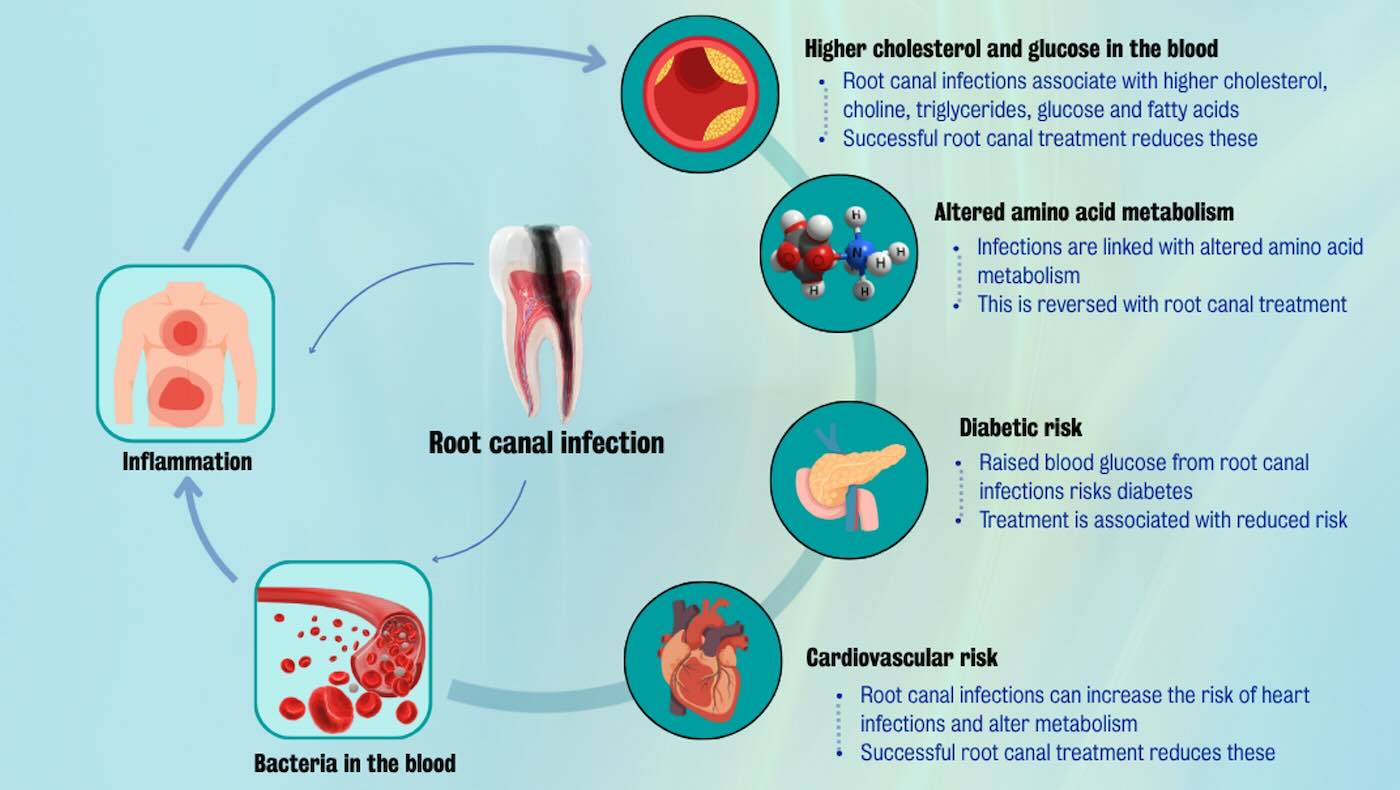Root Canal Treatment Reduces Heart Disease And Diabetes Risk

Successful root canal treatment can reduce inflammation linked to heart disease, according to new research.
The much dreaded dental surgery can also improve levels of blood sugar and cholesterol, say scientists.
In the first of its kind clinical study, King’s College London researchers tracked changes in blood chemistry following root canal treatment for a common dental infection, called apical periodontitis.
The infection can cause bacteria to enter the bloodstream and increase inflammation, associated with risks to cardiac health and reduced ability to control blood sugar levels.
Despite the link between the infection and wider health impacts, no one has investigated the association between successful root canal treatment and the benefits to heart and metabolic health until now.
The findings, published in the Journal of Translational Medicine, showed that successful root canal treatment was associated with improved glucose metabolism.
Blood sugar levels dropped “significantly” over two years after treatment, a key factor in preventing diabetes.
The treatment also resulted in better lipid profiles, short-term improvements in blood cholesterol and fatty acid levels, which are closely linked to heart health.
The findings also showed that the treatment saw key markers of inflammation, often linked to cardiovascular risk and other chronic conditions—decreased over time.
GREAT TIP: Be Sure and Floss! Researchers Say Good Dental Health ‘Substantially’ Decreases Risk of Alzheimer’s

Bacteria from infected teeth were associated with changes in the body’s overall metabolism, according to the findings. The research team explained that root canal infections can cause bacteria to enter the blood, leading to inflammation, heart disease and diabetes risk.
But successful treatment reduced those risks.
The study followed the health of 65 patients in England over two years after root canal treatment.
Scientists analyzed molecules in the blood of patients to reveal how the body processes sugar, fat, other key substances, and responds to disease and treatment. They used a technique known as nuclear magnetic resonance (NMR) spectroscopy, used to analyze proteins in the body.
DYNAMITE DENTAL NEWS:
• New Gel Regrows Dental Enamel–Which Humans Cannot Do–and Could Revolutionize Tooth Care
• Wisdom Teeth Contain Unique Stem Cell That Can Form Cartilage, Neurons, and Heart Tissue
The findings suggest that monitoring blood metabolic markers—such as glucose, fats known as triglycerides, and the protein tryptophan—could help assess recovery and risk after dental treatment.
“Our findings show that root canal treatment doesn’t just improve oral health – it may also help reduce the risk of serious health conditions like diabetes and heart disease,” said lead Author Dr. Sadia Niazi
“It’s a powerful reminder that oral (tooth) health is deeply connected to overall health.
“Long-standing root canal infections can allow bacteria to enter the bloodstream, trigger inflammation, and increase blood glucose and fats levels – raising the risk of serious health issues like heart disease and diabetes.”
While more research is needed to confirm the effects in larger populations, she says the study opens “exciting new doors” for understanding how oral care can support general health and well-being.
“It is vital that dental professionals recognise the wider impact of these root canal infections and advocate for early diagnosis and treatment,” added Dr. Niazi, a senior clinical lecturer in endodontics at King’s College London.
WILD, BUT TRUE: Tooth Is Implanted in 34-year-old’s Eye to Restore His Vision After Two Decades
“We also need to move towards integrated care, where dentists and general practitioners work together to monitor the risks through these blood markers and protect overall health.
“It’s time to move beyond the tooth and embrace a truly holistic approach to dental care.”



Please be good and do not spam. Thank you.